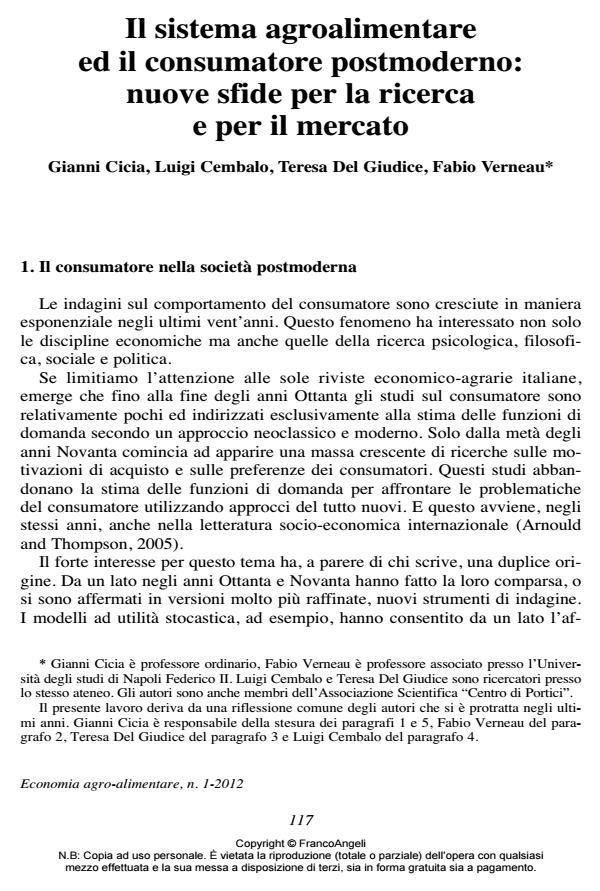Il sistema agroalimentare ed il consumatore postmoderno: nuove sfide per la ricerca e per il mercato
Titolo Rivista ECONOMIA AGRO-ALIMENTARE
Autori/Curatori Gianni Cicia, Luigi Cembalo, Teresa Del Giudice, Fabio Verneau
Anno di pubblicazione 2012 Fascicolo 2012/1 Lingua Italiano
Numero pagine 26 P. 117-142 Dimensione file 145 KB
DOI 10.3280/ECAG2012-001006
Il DOI è il codice a barre della proprietà intellettuale: per saperne di più
clicca qui
Qui sotto puoi vedere in anteprima la prima pagina di questo articolo.
Se questo articolo ti interessa, lo puoi acquistare (e scaricare in formato pdf) seguendo le facili indicazioni per acquistare il download credit. Acquista Download Credits per scaricare questo Articolo in formato PDF

FrancoAngeli è membro della Publishers International Linking Association, Inc (PILA)associazione indipendente e non profit per facilitare (attraverso i servizi tecnologici implementati da CrossRef.org) l’accesso degli studiosi ai contenuti digitali nelle pubblicazioni professionali e scientifiche
The paper is an attempt to analyze the role of consumers and some of the most important trends in the food systemin the Eght of a new interpretative key that refers to the concept of postmodernity which has been generated in the field of sociology and progressively outlined from the first 80s. In postmodern society the act of consumption becomes an expression of culture and identity creation, products as material objects lose their importance and they become marks, symbols and a way to communicate personality. These phenomenons are difficult to interpret with the standard theory of neoclassical consumer, although several attempts in this direction have been carried out. For example, the proposal to introduce a function of happiness to express the features and behavior of the postmodern consumer is a possibility to be explored but certainly not yet a new theory. In the first part of the report the concept of postmodernism, its origin and evolution is discussed. Later, in the light of this new interpretative key the changing role of the consumer is analyzed. Finally, as case studies, the strategies of modern distribution and the problem oftypical Italian food products in foreign markets are also discussed. All the analysed cases, illustrate very well the traditional rules can lead to political intervention pontentially erroneous, as for example, an excess of expenditure in food safety policy or policies of the national mark.;
Keywords:Postmodernity, consumer behaviour, modern distribution, italian sounding
Jel codes:DII, ZI3
- In support of framing Food Identity towards pro-environmental food choices through empirical evidence Mariarosaria Simeone, Fabio Verneau, in Quality & Quantity /2024
DOI: 10.1007/s11135-023-01826-1 - Le preferenze dei consumatori della provincia di Trieste per l'olio extra vergine di oliva d'alta gamma Francesco Caracciolo, Teresa Del Giudice, Alessandro Esposito, Sandro Sillani, in ECONOMIA AGRO-ALIMENTARE 1/2014 pp.139
DOI: 10.3280/ECAG2014-001007 - Consumo e consumatori di prodotti alimentari nella società postmoderna Gervasio Antonelli, Gian Italo Bischi, Fabio Tramontana, Elena Viganò, in ECONOMIA AGRO-ALIMENTARE 1/2015 pp.59
DOI: 10.3280/ECAG2015-001004 - Adaptation processes of agro-food companies toward responsibility Annalisa De Boni, Pietro Pulina, Rocco Roma, in ECONOMIA AGRO-ALIMENTARE 1/2016 pp.13
DOI: 10.3280/ECAG2016-001002 - Sustainability and New Models of Consumption: The Solidarity Purchasing Groups in Sicily Luigi Cembalo, Giuseppina Migliore, Giorgio Schifani, in Journal of Agricultural and Environmental Ethics /2013 pp.281
DOI: 10.1007/s10806-011-9360-0 - The role of socio-demographic variables and buying habits in determining milk purchasers’ preferences and choices Valentina Maria Merlino, Oriana Mosca, Simone Blanc, Antonina Sparacino, Stefano Massaglia, Danielle Borra, Giulia Mastromonaco, Ferdinando Fornara, in Frontiers in Nutrition 1072208/2023
DOI: 10.3389/fnut.2023.1072208 - Le filiere corte auto-organizzate dai consumatori: il modello dei Gruppi di Acquisto Solidale Emanuele Blasi, Clara Cicatiello, Silvio Franco, Barbara Pancino, in ECONOMIA AGRO-ALIMENTARE 2/2015 pp.33
DOI: 10.3280/ECAG2015-002003 - Progetto Marketplace Ecosostenibile Calabria e nuovi modelli organizzativi aziendali: il ruolo del Project Management Elena Peditto, in PROJECT MANAGER (IL) 52/2022 pp.20
DOI: 10.3280/PM2022-052005 - Sustainable agri-food products: A review of consumer preference studies through experimental economics Lucio CECCHINI, Biancamaria TORQUATI, Massimo CHIORRI, in Agricultural Economics (Zemědělská ekonomika) /2018 pp.554
DOI: 10.17221/272/2017-AGRICECON - What attributes of extra virgin olive oil are really important for consumers: a meta-analysis of consumers’ stated preferences Teresa Del Giudice, Carla Cavallo, Francesco Caracciolo, Gianni Cicia, in Agricultural and Food Economics 20/2015
DOI: 10.1186/s40100-015-0034-5 - Le sfide per uno sviluppo sostenibile del sistema agroalimentare italiano e non solo Fausto Cantarelli, in ECONOMIA AGRO-ALIMENTARE 2/2016 pp.229
DOI: 10.3280/ECAG2016-002007
Gianni Cicia, Luigi Cembalo, Teresa Del Giudice, Fabio Verneau, Il sistema agroalimentare ed il consumatore postmoderno: nuove sfide per la ricerca e per il mercato in "ECONOMIA AGRO-ALIMENTARE" 1/2012, pp 117-142, DOI: 10.3280/ECAG2012-001006